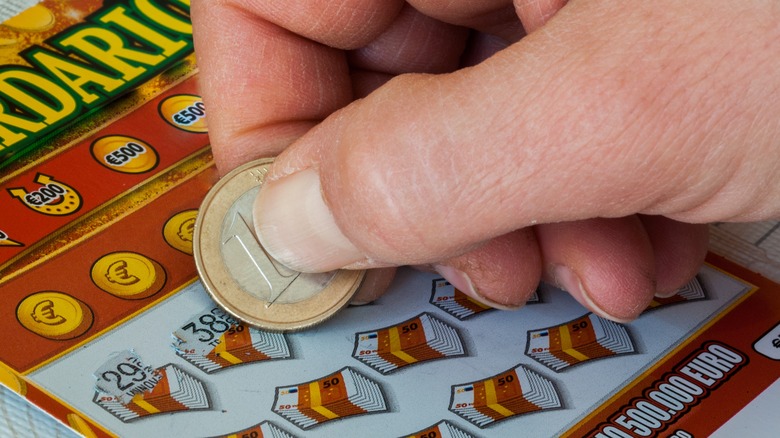When the odds are stacked against you, you’ve probably heard somebody refer to your chances as “one in a million.” Yet the likelihood of winning the lottery is even slimmer than that. Rather, CNBC reports that the odds are roughly 1 in 292.2 million for scoring the Powerball jackpot. In other words, you have greater odds of getting hit by lightning. Although the chances of winning seem just shy of impossible, the idea of being that 1 in 292.2 million winner can give you quite a thrill. In fact, that’s almost exactly what’s happening inside your body when you play the lottery.
The impulse to take a gamble and buy that lottery ticket as you approach the check-out counter at the gas station has a lot to do with a neurotransmitter in the brain known as dopamine, explains Stanford University psychology professor Brian Knutson to Medical XPress. “There’s something about that display that is getting them motivated and psyched up. And when that happens, we think dopamine is released, particularly in the nucleus accumbens,” a brain region associated with feelings of excitement, Knutson tells the publication. Experts say that it’s this dopamine-fueled surge of excitement that can override the caution center of the brain, leaving you coming back for more.
How winning money affects the body and brain

Just the possibility of winning money can have an effect on your heart, according to a 2005 study published in Psychology of Addictive Behaviors. Among 80 male college student participants, those who were presented with the opportunity to win money by betting on a horse race experienced increases in heart rate and greater feelings of excitement over those who did not place a bet. Furthermore, the students who won the bet were shown to have a faster heart rate compared to those who had lost once the race came to an end.
Similar to winning a bet, if Lady Luck is on your side and you were to win the jackpot, experts at Gateway Foundation say that a flood of dopamine can produce quite the rush. For some people, it may push them to seek that same feeling over and over. However, as they continue to gamble, their brain becomes accustomed to these dopamine levels and it no longer creates the desired effect. For some, this may lead to a gambling addiction, in which they continue to take progressively bigger risks in order to win and activate the reward center of the brain.
If you or anyone you know needs help with addiction issues, help is available. Visit the Substance Abuse and Mental Health Services Administration website or contact SAMHSA’s National Helpline at 1-800-662-HELP (4357)
Can winning the lottery make you a happier person?

While money can certainly provide us with an increased sense of security, science shows that it may not necessarily provide that same boost when it comes to happiness. Early research from 1978 published in the Journal of Personality and Social Psychology looked at 22 lottery winners compared with 22 control participants, as well as 29 individuals who had been paralyzed in an accident. Of those in the lottery group, some had received as much as $1 million in winnings, reports The Cut. When it came to self-reported measures of day-to-day happiness, both the lottery winners and the participants who had been in accidents ranked similarly in their scores. Yet out of all three groups, the lottery winners turned out to have the lowest scores when it came to enjoyment in everyday experiences (via ScienceAlert). Such experiences included eating a meal, conversing with a friend, or being given a compliment (per The Cut).
Experts attribute these findings to what’s known as “hedonic adaptation,” reports The Cut. In essence, the initial excitement of winning the lottery will diminish and our happiness will eventually return to baseline as this new level of wealth becomes the norm. Further explaining this phenomenon, the publication cites a 1978 research paper stating, “As lottery winners become accustomed to the additional pleasures made possible by their new wealth, these pleasures should be experienced as less intense and should no longer contribute very much to their general level of happiness.”
So if money isn’t the answer, what is?

false/Shutterstock
If a boost in our finances isn’t the key to happiness, then what is? Dr. Sanjiv Chopra, a professor of medicine at Harvard Medical School, shares in his TED Talk that fostering close relationships with loved ones, offering forgiveness, giving to others, and expressing gratitude on a regular basis are four factors that can have a significantly greater impact on our state of happiness compared to an influx of income (via CNBC).
Erik Lindqvist, the lead researcher on a 2024 study published in The Review of Economic Studies dealing with the long-term psychological effects of winning the lottery, lends further evidence to these claims. “We find that winning large sums of money strongly affects how content you are with your personal finances. But it does not affect how you feel about other aspects of life, such as your health, or your relationships with friend[s] and family,” Lindqvist states via a press release from the Swedish Institute for Social Research.
As previously mentioned, we’re more likely to get struck down by a bolt of lightning than score a winning lottery ticket. However, if you still wish to play your hand at the Powerball jackpot every now and again, know that winning isn’t entirely out of reach. Fun fact — a man in Canada who had been hit by lightning as a teenager, also won the lottery in 2024, reports Time.




